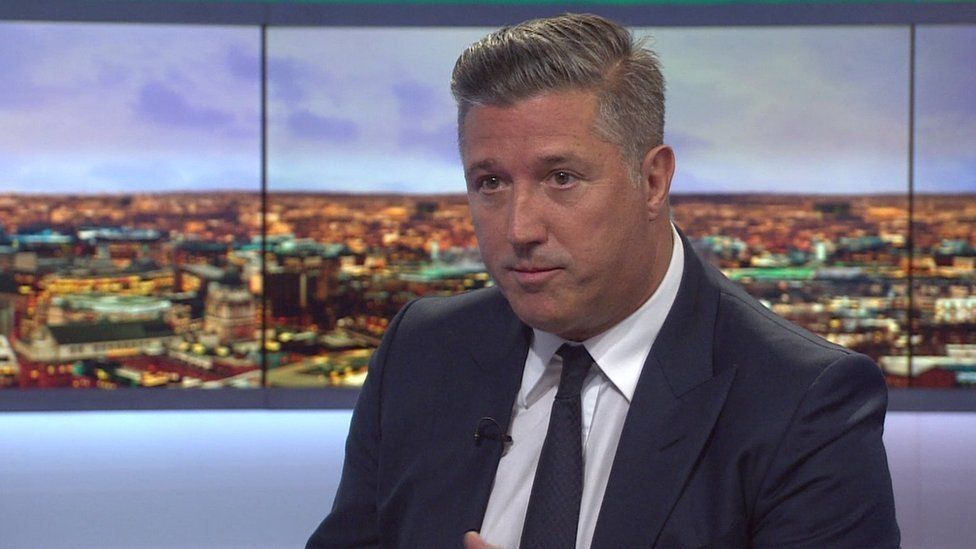
Robert Gros appeared on BBC Business Live in 2018
By Jon Ironmonger
BBC News, Cambridgeshire
A businessman whose company supplied the NHS with millions of apparently unusable surgical gowns earned £47m in dividends last year.
During the Covid pandemic, Cambridge-based Chemical Intelligence won £162m of government contracts to provide personal protective equipment (PPE).
Data obtained by the BBC shows at least a fifth of the equipment supplied was classified as “not fit for use”.
Chemical Intelligence said all the PPE it provided was fit for purpose.
The Department for Health and Social Care (DHSC) told the BBC it was in “a commercial dispute with this supplier” so could not comment further.
Lawyers acting for Robert Gros, the sole owner and chief executive officer of Chemical Intelligence, said “no complaint has been made to our client for the provision of these items of PPE”.
They added that there had been an issue with the DHSC being unable to locate the correct documentation for some products.
Chemical Intelligence was founded in 2012, and five years later successfully licensed an antimicrobial medical glove.
Image source, UK Government
The DHSC contract includes of an image of the Chinese-manufactured gowns
According to public contract data, it was awarded three contracts from the DHSC in April and May 2020 totalling £162m to ship gowns and face-masks from China.
The company, then made up of two employees, said it was invited to supply PPE during the pandemic because of its proven track record.
Companies House records show it went on to make an operating profit of more than £30m in the years ending August 31st in both 2020 and 2021.
Spreadsheets leaked to the Good Law Project and seen by the BBC suggest the DHSC ordered 20.5 million gowns from Chemical Intelligence at a total cost of £160m and spent an extra £1.98m on two million face masks.
Further data obtained by the BBC showed that in January the department was holding 4.5 million gowns supplied by Chemical Intelligence that had been “subclassified as not fit for use”.
“The value of this stock has been written down to £0 in the department’s accounts,” the Freedom of Information Act response added.
Mr Gros’s lawyers said they did not understand the DHSC classification “not fit for use” or “valued at £0” and that there were a number of reasons why PPE might be unable to be used.
They said the company believed all the stock they provided was usable and told the BBC it had successfully provided good quality PPE for more than a decade.
Of the remaining gowns supplied by Chemical Intelligence, the DHSC said in response to an FOIA request in March that 217,000 had been handed to NHS Trusts.
This means that 1.06% of the 20.5 million gowns provided in 2020 had been used by April this year.
The DHSC said the gowns had been released for NHS use – there is no suggestion that any are faulty.
In January 2022, Chemical Intelligence paid £7m in dividends and two months later paid dividends of £40m into a holding company, wholly owned by Robert Gros.
The company’s lawyers said that this was largely reinvested for research and development and that profits were not solely related to the DHSC PPE contracts.
Chemical Intelligence has acquired office space in central Cambridge
Mr Gros, 55, has since acquired office space on Hill Road in Cambridge and purchased a £3.95m house in Cambridgeshire.
Job adverts posted on LinkedIn in November by his chief of staff said a “high calibre cleaner” was required at her client’s “large home” to “suit the family’s high standards”.
Responsibilities included arranging fresh flowers; care of fine furniture and cleaning the inside of vehicles.
His lawyers say the house was not bought with money from any DHSC contract.
There is no suggestion Chemical Intelligence Ltd broke any rules or acted improperly in any way.
However, questions remain over the DHSC’s handling of contracts for PPE and the use of public money to purchase equipment which has still not been released to NHS frontline services.
A House of Commons Committee report published in June said that of the £12bn spent on PPE the department had “£4bn of PPE in storage that will not be used in the NHS”.
A DHSC spokesman said: “We acted swiftly to procure PPE at the height of the pandemic, competing in an overheated global market where demand massively outstripped supply.
“Due diligence was carried out on all companies that were referred to the department and every company was subjected to the same checks.
“We are in a commercial dispute with this supplier and therefore cannot comment further at this time.”








